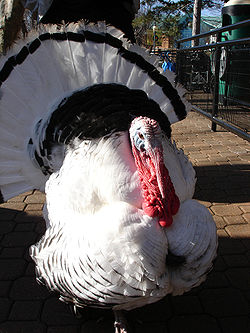Royal Palm turkey: Difference between revisions
m Typo fixing, typos fixed: agressive → aggressive using AWB |
|||
| Line 18: | Line 18: | ||
{{Commonscat}} |
{{Commonscat}} |
||
* [http://www.feathersite.com/Poultry/Turkeys/BRKRoyalPalm.html Royal Palms] at feathersite.com |
* [http://www.feathersite.com/Poultry/Turkeys/BRKRoyalPalm.html Royal Palms] at feathersite.com |
||
* [http://www.howtoraiseturkeys.com Raising Turkeys] - Learn from Experienced Turkey Breeders |
|||
{{DEFAULTSORT:Royal Palm (Turkey)}} |
{{DEFAULTSORT:Royal Palm (Turkey)}} |
||
Revision as of 07:37, 17 October 2009

The Royal Palm is a breed of domestic turkey. One of the few turkeys not primarily selected for meat production, the Royal Palm is best known as an ornamental bird with a unique appearance. Primarily kept as an exhibition bird, or on small farms, it lacks the size for large scale commercial use. Tom's usually weight 22 to 16 lbs and the Hens 12 to 10 lbs.
A relative newcomer among turkey breeds, birds with the similar plumage first appeared in the 1920s, but the Royal Palm was not accepted in to the American Poultry Association's Standard of Perfection until 1971. In Europe, it is sometimes called the Crollweitzer, Pied or Black-laced White.
Along with the decline of most heritage turkey breeds after the adoption of the Broad Breasted White by the turkey industry, Royal Palms are a very endangered breed today. The American Livestock Breeds Conservancy categorizes the breed as critical on its watchlist, the highest priority of conservation. It is also included in Slow Food USA's Ark of Taste, a catalog of heritage foods in danger of extinction.
The toms are noted for being non-aggressive and the hens are particularly good mothers.
References
- Ekarius, Carol (2007). Storey's Illustrated Guide to Poultry Breeds. Storey Publishing. ISBN 9781580176675.
- "Royal Palm". American Livestock Breeds Conservancy. Retrieved 2008-07-22.
- "Royal Palm Turkey". Ark of Taste. Slow Food USA. Retrieved 2008-07-22.
External links
- Royal Palms at feathersite.com
- Raising Turkeys - Learn from Experienced Turkey Breeders
